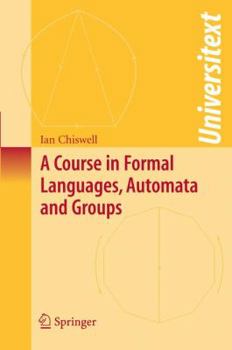A Course in Formal Languages, Automata and Groups
This book is based on notes for a master's course given at Queen Mary, University of London, in the 1998/9 session. Such courses in London are quite short, and the course consisted essentially of the material in the ?rst three chapters, together with a two-hour lecture on connections with group theory. Chapter 5 is a considerably expanded version of this. For the course, the main sources were the books by Hopcroft and Ullman ( 20]), by Cohen ( 4]), and by Epstein et al. ( 7]). Some use was also made of a later book by Hopcroft and Ullman ( 21]). The ulterior motive in the ?rst three chapters is to give a rigorous proof that various notions of recursively enumerable language are equivalent. Three such notions are considered. These are: generated by a type 0 grammar, recognised by a Turing machine (deterministic or not) and de?ned by means of a Godel ] numbering, having de?ned "recursively enumerable" for sets of natural numbers. It is hoped that this has been achieved without too many ar- ments using complicated notation. This is a problem with the entire subject, and it is important to understand the idea of the proof, which is often quite simple. Two particular places that are heavy going are the proof at the end of Chapter 1 that a language recognised by a Turing machine is type 0, and the proof in Chapter 2 that a Turing machine computable function is partial recursive.
Format:Paperback
Language:English
ISBN:1848009399
ISBN13:9781848009394
Release Date:February 2009
Publisher:Springer
Length:157 Pages
Weight:0.60 lbs.
Dimensions:0.5" x 6.1" x 9.1"
Customer Reviews
0 rating





